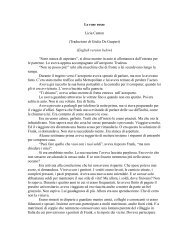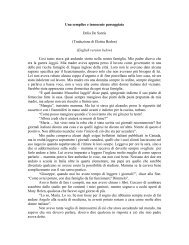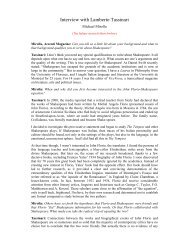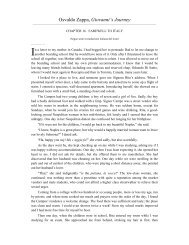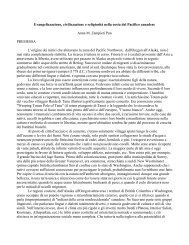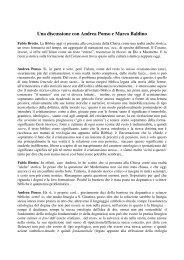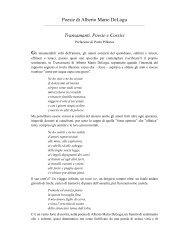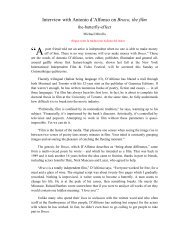quindici ragioni per john florio, l'uomo che era shakespeare
quindici ragioni per john florio, l'uomo che era shakespeare
quindici ragioni per john florio, l'uomo che era shakespeare
Create successful ePaper yourself
Turn your PDF publications into a flip-book with our unique Google optimized e-Paper software.
QUINDICI RAGIONI PER JOHN FLORIO,<br />
L’UOMO CHE ERA SHAKESPEARE<br />
Lamberto Tassinari<br />
(The English version follows below)<br />
1. John Florio ha introdotto oltre mille neologismi nella lingua inglese, un contributo simile a<br />
quello attribuito a William Shakespeare. Inoltre Florio ha realizzato il primo dizionario italianoinglese<br />
<strong>che</strong>, nell’edizione del 1611, conteneva 74 000 parole italiane, il triplo di quello<br />
dell’Accademia della Crusca uscito nel 1612 a Firenze e almeno 150 000 inglesi. Frances Yates,<br />
autrice di una fondamentale biografia di John Florio (1934) lo definisce la summa della cultura<br />
dell’epoca.<br />
2. John Florio e il padre Mi<strong>che</strong>l Angelo - figlio di ebrei convertiti, ex frate francescano divenuto<br />
protestante - sono due italiani eruditi come pochi lo <strong>era</strong>no in Inghilterra. Tutto il sa<strong>per</strong>e: arti,<br />
scienze, lett<strong>era</strong>ture. Dalla teologia alla botanica, dalla medicina alla falconeria, dal diritto alla<br />
marineria. Una conoscenza enciclopedica: proprio come quella <strong>che</strong> dimostra di possedere<br />
Shakespeare. Certamente nessuno conosceva le lett<strong>era</strong>ture continentali come John <strong>che</strong> le<br />
insegnava avendole lette nelle lingue originali (italiano, francese e spagnolo)<br />
3. Religione: a cavallo tra la tradizione ebraica degli avi, la nuova religione cattolica di Mi<strong>che</strong>l<br />
Angelo e infine la conversione al protestantesimo. È l’indicibile “confusione” delle fedi e delle<br />
liturgie del figlio John <strong>che</strong> coincide con quella di Shakespeare.<br />
4. Lo stile/linguaggio: William Shakespeare e John Florio scrivono in modo identico. La stessa<br />
ampollosità, lo stesso uso esag<strong>era</strong>to di metafore, tutte le stesse figure retori<strong>che</strong>, lo stesso spirito<br />
(quips, puns), lo stesso senso poetico, lo stesso uso estensivo dei proverbi. Inoltre formano le<br />
parole nello stesso modo. La verifica è facile: basta leggere i testi introduttivi delle o<strong>per</strong>e di<br />
erudizione, Il dizionario A Worlde of Wordes (1598), la traduzione dei Saggi di Montaigne (1603)<br />
e i First (1578) e Second Fruits (1591), due vivacissimi e colti libretti didattici bilingui<br />
italiano/inglese. Infine, prova fondamentale, migliaia di parole e FRASI scritte PRIMA da Florio<br />
si ritrovano POI nelle o<strong>per</strong>e di Shakespeare. Due frasi di Florio sono destinate a diventare titoli di<br />
commedie di William Shakespeare. Florio è un funambolo del linguaggio e un poliglotta: alle<br />
quattro lingue moderne va aggiunto il latino, il greco e l’ebraico. Lo stesso, concludono quasi tutti<br />
gli specialisti, vale <strong>per</strong> William Shakespeare.<br />
5. Quando si apprende <strong>che</strong> John Florio ha tradotto i Saggi di Montaigne e il Decamerone di<br />
Boccaccio (1620), non se ne realizza subito l’importanza. Erudizione non è poesia…e oggi il<br />
traduttore è un mestiere come un altro. Ma quando leggiamo le traduzioni di Florio, si capisce<br />
immediatamente <strong>che</strong> si tratta di un’o<strong>per</strong>a eccezionale. Non solo <strong>per</strong> l’”idea” missionaria di tradurre<br />
in Inghilterra in un momento così cruciale queste o<strong>per</strong>e fondamentali <strong>per</strong> lo sviluppo della<br />
cultura inglese <strong>che</strong> è in sé un fatto straordinario, ma soprattutto <strong>per</strong> la qualità della scrittura di<br />
Florio. Il quale, traducendo, dimostra di essere uno scrittore grande, un poeta vicinissimo a<br />
Shakespeare. Se si tiene conto del fatto <strong>che</strong> qui Florio scrive “in prosa” e non in versi, allora<br />
questa vicinanza equivale a una coincidenza. Per T.S. Eliot la traduzione del Montaigne è un<br />
classico delle lettere inglesi.<br />
6. L’impressionante conoscenza della Bibbia e delle liturgie, cattolica e protestante, <strong>che</strong><br />
Shakespeare mostra di possedere si accorda <strong>per</strong>fettamente con la biografia di John Florio figlio di<br />
un ex frate francescano, poi predicatore e pastore protestante. I due Florio, consid<strong>era</strong>ti finora due<br />
protagonisti minori della piccola diaspora eretica e protestante italiana, sono in realtà i primi<br />
grandi diffusori e promotori della cultura italiana all'estero. Il giovane Florio ha studiato<br />
all’università tedesca di Tübingen con Pier Paolo Vergerio ex vescovo di Capodistria divenuto<br />
teologo protestante e in Inghilterra è stato amico e frequentatore di scienziati e eruditi riformati<br />
italiani come Teodoro Diodati fratello del calvinista Giovanni primo traduttore italiano della<br />
Bibbia.
7. Tra i libri posseduti - 340 italiani, francesi, spagnoli + un imprecisato numero di inglesi - e/o<br />
letti (252) da John Florio <strong>per</strong> la preparazione del dizionario New World of Words ci sono tutti<br />
quelli <strong>che</strong> risultano essere stati necessariamente letti da Shakespeare, an<strong>che</strong> nell’originale. Nel<br />
suo testamento (da confrontare assolutamente con quello mediocre dello Shaks<strong>per</strong>e di Stratford)<br />
John Florio lascia la sua biblioteca di libri italiani, francesi e spagnoli all’amico e protettore Lord<br />
William Pembroke. Oggi questi 340 volumi sono tutti scomparsi, volatilizzati.<br />
8. Le o<strong>per</strong>e di Shakespeare sono impregnate di “cultura dell’esilio”, una cultura, non c’è bisogno<br />
di insistere, familiarissima a Florio.<br />
9. La grande influenza del pensiero e del lessico di Montaigne su William Shakespeare, ammessa<br />
a denti stretti dai critici shakespeariani è invece reale, <strong>per</strong>vasiva come ha dimostrato nel 1925<br />
G.C.Taylor e come chiunque può constatare da solo.<br />
10. La grande conoscenza di autori italiani di cui alcuni non tradotti in inglese. Il primo è<br />
Giordano Bruno. La presenza del pensiero di Giordano Bruno e del suo lessico nelle o<strong>per</strong>e di<br />
William Shakespeare è flagrante. Ma tuttavia negata o ignorata dai dotti. Si tratta, a ben vedere, di<br />
una presenza “fisica”, intima, proprio una condivisione di idee, di gusti. Una prossimità<br />
inspiegabile se si pensa all’uomo di Stratford ma naturale e normale se si pensa <strong>che</strong> John Florio e<br />
Giordano Bruno sono stati due anni e mezzo insieme ospiti dell’ambasciatore francese a Londra<br />
dal 1583 al 1585. I rimandi dell’uno all’altro sono numerosi nelle loro o<strong>per</strong>e.<br />
11. La conoscenza approfondita della musica sorprende in William Shakespeare, eppure è<br />
incontestabile. John Florio ERA un musicista e lavorava a corte an<strong>che</strong> con questo ruolo di<br />
selezionatore di musicisti.<br />
12. William Shakespeare ha senza alcun dubbio una forte carica aristocratica, lui figlio di<br />
contadini analfabeti e con due figlie illett<strong>era</strong>te! John Florio è stato maestro e amico di altissimi<br />
aristocratici e <strong>per</strong> 16 anni Groom of the Privy Chamber presso il re James I e segretario<br />
particolare della regina Anne di Danimarca.<br />
13. Tutti quelli <strong>che</strong> appaiono essere, nella anemica biografia dell’uomo di Stratford, degli “amici”<br />
del drammaturgo, sono poi gli storicamente ineccepibili amici di John Florio! Da lord<br />
Southampton a William Pembroke, presunti padrini di William Shakespeare, in realtà storici<br />
allievi e protettori di John Florio! da Ben Jonson <strong>che</strong> consid<strong>era</strong> Florio un maestro e lo scrive in<br />
una dedica autografa del suo Volpone (“ To his loving Father and worthy Friend Master John<br />
Florio. Ayden of his Muses.”), a molti altri.<br />
14. William Shakespeare dimostra un’indiscutibile sensibilità italiana. Gli esempi abbondano.<br />
Sedici plays hanno argomento italiano. William Shakespeare mostra di conoscere benissimo la<br />
lingua italiana di cui ha letto o<strong>per</strong>e nell’originale, compresi il difficile Giordano Bruno, Ariosto,<br />
Aretino (un altro degli ispiratori maggiori del bardo) e, prova tra le prove, a volte Shakespeare si<br />
ispira all’originale italiano piuttosto <strong>che</strong> alla disponibile traduzione inglese.<br />
15. Infine, una prova ontologica e sociologica insieme. Se due <strong>per</strong>sonaggi del genere fossero<br />
ambedue esistiti a Londra nello stesso <strong>per</strong>iodo, si sarebbero certamente incontrati, probabilmente<br />
scontrati, comunque conosciuti lasciando grosse tracce sul terreno! E invece niente. Se Florio, <strong>che</strong><br />
aveva gli stessi mecenati e gli stessi amici, gli stessi interessi, passioni e competenze di<br />
Shakespeare, non l’ha mai incontrato e non ne ha mai parlato, vuol dire <strong>che</strong> William Shakespeare<br />
non è mai esistito come autore erudito, poliglotta, aristocratico, italianizzante a cui sono attribuite<br />
le o<strong>per</strong>e firmate (quando lo <strong>era</strong>no) William Shakespeare.<br />
________________________________________________________________________<br />
In http://www.<strong>john</strong><strong>florio</strong>-is-<strong>shakespeare</strong>.com/<strong>florio</strong>2.html /Si veda in Bibliosofia “Presentiamo Lamberto<br />
Tassinari” <strong>per</strong> il suo profilo biografico.<br />
1 febbraio 2010
FIFTEEN REASONS FOR JOHN FLORIO,<br />
THE MAN WHO INVENTED SHAKESPEARE<br />
Lamberto Tassinari<br />
1. John Florio added more than one thousand new words to the English language, the same<br />
contribution attributed to William Shakespeare. Furthermore, Florio compiled the first<br />
Italian/English dictionary. The 1611 edition contained 74,000 Italian words and 150,000 English<br />
words. Frances Yates, author of Florio’s biography (1934) defines Florio’s dictionary as the<br />
epitome of the <strong>era</strong>’s culture.<br />
2. John Florio and his father Mi<strong>che</strong>l Angelo, a former Franciscan monk who converted to<br />
Protestantism (and the son of converted Jews), are two erudite Italian scholars like few at that<br />
time in England. They possessed a vast knowledge of the arts, science, lit<strong>era</strong>ture, theology,<br />
botany, medicine, falconry, law and seamanship – an encyclopedic knowledge which<br />
Shakespeare clearly commanded. Few knew European lit<strong>era</strong>ture like John Florio who, having<br />
read the material in the original languages (Italian, French and Spanish), also taught it.<br />
3. Immersed between the Jewish traditions of his ancestors and the Catholic and Protestantism<br />
religions of his father Mi<strong>che</strong>l Angelo is John Florio, whose vast knowledge sacred scriptures<br />
coincides with Shakespeare’s.<br />
4. William Shakespeare and John Florio display the same bombastic style: the same exagg<strong>era</strong>ted<br />
use of metaphor, rhetoric, wit (quips and puns), poetic sense and extensive use of proverbs. They<br />
even coin words in the same fashion. This is easily verified in the introductory texts of Florio’s<br />
scholarly works: Il Dizionario, A Worlde of Wordes (1598), First Fruits (1578) and Second Fruits<br />
(1591), two brilliant Italian/English teaching booklets. Thousands of words and phrases written<br />
by Florio appear later in Shakespeare’s works. Two of Florio’s phrases become titles of William<br />
Shakespeare’s comedies. Florio is a juggler of words and a polyglot: he speaks four modern<br />
languages, as well as Latin, Greek and probably Hebrew – the same languages known by<br />
Shakespeare, according to scholars.<br />
5. John Florio translated Montaigne’s Essays and Boccaccio’s Decameron, two exceptional<br />
works. The “idea” of trans-lating these fundamental texts during such a crucial time for the<br />
development of English culture is in itself an extraordinary feat. Florio’s translations prove that<br />
he is a great writer, a poet close in spirit and style to Shakespeare. If we keep in mind that Florio<br />
was writing “in prose” and not in “verse” like Shakespeare, this closeness is undeniable.<br />
6. The impressive knowledge of the Bible and liturgies, both Catholic and Protestant, which<br />
Shakespeare supposedly possesses mat<strong>che</strong>s <strong>per</strong>fectly with John Florio’s biography. The two<br />
Florios, father and son, are regarded by critics as minor characters within the small Protestant and<br />
heretic Italian diaspora. In reality, they were the first major promoters of Italian culture abroad.<br />
The younger Florio studied at the German University of Tübingen with Pier Paolo Vergerio, an<br />
ex-Catholic bishop of Capodistria, converted to Protestantism. In England, he befriended the<br />
circle of reformed scientists and scholars which included Teodoro Diodati, the brother of<br />
Giovanni, a Calvinist and the first Italian translator of the Bible.<br />
7. John Florio owned 340 books in Italian, French and Spanish and an unknown number in<br />
English. He read 252 books in preparation for his dictionary New World of Words. These are the<br />
same books which Shakespeare had to have read in the original language as inspirations for his<br />
plays. Florio’s will bequeath his library of Italian, French and Spanish books to his friend and<br />
protector William Herbert, Earl of Pembroke.<br />
8. The works of Shakespeare demonstrate “a culture of exile,” a theme very familiar to Florio.
9. The great influence of Montaigne’s thought and vocabulary upon William Shakespeare,<br />
reluctantly recognized by Shakespearean scholars, was demonstrated by George Coffin Taylor’s<br />
Shakespeare’s Debt to Montaigne (1925).<br />
10. The vast knowledge of Italian writers, some of whom had not yet been translated into English,<br />
could not have been known by the “man from Stratford.” One clear example is Giordano Bruno, a<br />
Neapolitan heretic philosopher burned at the stake by the Roman Inquisition in 1600. The<br />
presence of Bruno’s thought and vocabulary in Shakespeare’s works is evident – it is a “physical”<br />
presence, which is refuted or ignored by Shakespearean scholars. This closeness is unexplainable<br />
if one considers the “man from Stratford,” but natural and normal if one remembers that John<br />
Florio and Giordano Bruno were house guests of the French ambassador in London for more than<br />
two years (from 1583 to 1585). Many of their works cross-reference each other.<br />
11. William Shakespeare’s impressive musical knowledge is surprising, and very difficult to<br />
explain. John Florio, on the other hand, was a musician and was responsible for inviting<br />
musicians to <strong>per</strong>form at the royal court.<br />
12. William Shakespeare is shown to possess a strong aristocratic <strong>per</strong>sona. Yet the man normally<br />
credited with writing the plays is the son of illit<strong>era</strong>te parents, and father of two illit<strong>era</strong>te<br />
daughters. John Florio, on the other hand, was a tea<strong>che</strong>r and friend of powerful aristocrats and the<br />
Groom of the Privy Chamber to James I and Queen Anne for 16 years.<br />
13. All the “friends” of Shakespeare who appear in the colourless biography of the man from<br />
Stratford are John Florio’s historically documented friends – from Lord Southampton to William<br />
Pembroke. William Shakespeare’s presumed godfathers were John Florio’s well-known students<br />
and protectors. Ben Jonson considers Florio “his loving Father and worthy Friend Master John<br />
Florio. Ayden of his Muses.”. Similar tributes are shared by many other nobles.<br />
14. William Shakespeare demonstrates an undeniable Italian sensibility. Examples abound, as 16<br />
plays boast Italian plots. The man from Stratford shows an excellent knowledge of Italian, as if he<br />
read the arduous Giordano Bruno, Ariosto, Aretino (another one of the Bard’s major inspirations)<br />
in the original. Naseeb Shaheen states in his Biblical References in Shakespeare's Plays (1999)<br />
that, when an English translation is available, Shakespeare’s words resemble the original Italian.<br />
15. Finally, there is an ontological and sociological proof all in one. If two such characters –<br />
Shakespeare and John Florio – had lived in London at the same time, if they had shared patrons,<br />
friends, interests, passions and abilities, then why have they never met nor is there any mention of<br />
them meeting? Perhaps they would even have clashed, leaving behind visible traces. Instead,<br />
there is a total void. They could not have met, of course, since they are one and the same! If<br />
Florio shared with Shakespeare the same patrons, the same friends, the same interests, passions<br />
and abilities and yet never met him, nor mentioned him, proves once more that William<br />
Shakespeare never existed as the scholarly, multilingual, aristocratic Italianizing author of the<br />
works penned (when they were) by William Shakespeare.<br />
________________________________________________________________________<br />
In http://www.<strong>john</strong><strong>florio</strong>-is-<strong>shakespeare</strong>.com/<strong>florio</strong>2.html /See in Bibliosofia “Introducing Lamberto<br />
Tassinari” for his biography.<br />
February 1st, 2010



